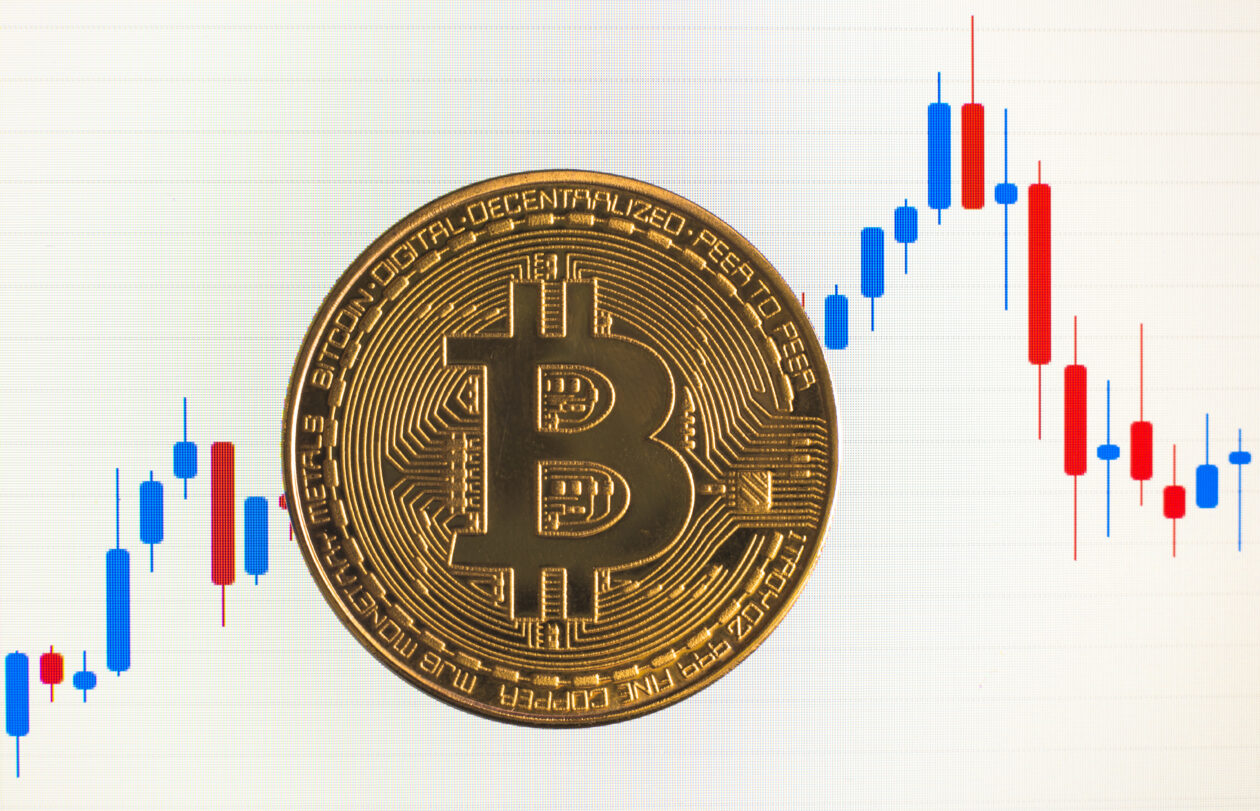Bitcoin fell Wednesday morning in Asia to trade below US$26,000. Ether also dropped to near the US$1,600 support level as all other top 10 non-stablecoin cryptocurrencies traded flat to lower. Solana’s SOL led the losers. The Forkast 500 NFT index declined, while a former manager at NFT marketplace OpenSea received jail time for insider trading. U.S. stock futures edged higher after Wall Street closed mixed on Tuesday. S&P Global Ratings joined the Moody’s ratings agency in downgrading a number of U.S. banks.
New Bitcoin support level at US$25,000?
Bitcoin dipped 0.71% in the last 24 hours to US$25,946.61 as of 07:20 a.m. in Hong Kong and lost 11.05% for the week, according to CoinMarketCap data. The world’s leading cryptocurrency has been trading around the US$26,000 mark this week following a near 10% slide last Friday. But it reached a 24-hour low of US$25,520.73 on early Wednesday morning.
After the previous week’s nosedive, some crypto analysts are predicting further losses. Social media commentator Ali Martinez put the token’s new key support level at US$25,400. Keith Alan, co-founder of analytics firm Material Indicators, put it as low as US$25,000. Both Martinez and Alan said losing the key support level could drive the token to a new low in the US$20,000 range.
“Bitcoin prices falling below a US$25,000 support level could be considered a bearish indicator, from a technical perspective, as it may signal a general uptrend reversal,” Wade Guenther, partner at U.S.-based asset management firm Wilshire Phoenix, said in an emailed comment.
Meanwhile, Bitcoin’s technical indicators including the Relative Strength Index (RSI) and the Moving Average Convergence Divergence (MACD) suggest the token’s price could be oversold.
“The 50-day moving average (MA) has begun to sharply diverge towards the 200-day MA. Generally, it could be considered a bearish signal if the 50-day MA crosses below the 200-day MA,” added Guenther.
On the regulatory front, investors await a much-anticipated verdict in the lawsuit between Grayscale Investments and the U.S. Securities and Exchange Commission (SEC). Grayscale has applied for permission from the regulator to convert its Bitcoin trust product (GBTC) to a spot Bitcoin exchange-traded fund (ETF). However, the decision was delayed twice last week.
That delay added to the delays of other Bitcoin applications. On Aug. 11 the SEC delayed its decision on the ETF application submitted by Cathie Wood’s Ark Invest.
Elsewhere, decentralized finance (DeFi) platform Balancer reported Tuesday that it had detected a vulnerability affecting several of its liquidity pools.
The company said it has introduced “emergency mitigation procedures” to secure user assets. An update on early Wednesday showed 1.4% of the total value locked (TVL) on Balancer was still at risk. That would amount to US$9.19 million, according to data from DefiLlama.
Like Bitcoin, Ether posted losses. It fell 2.20% to US$1,631.18 for a 10.75% decline over the past seven days.
Most other top 10 non-stablecoin cryptocurrencies traded lower over the past 24 hours. The exceptions included Tron’s TRX, which logged a gain of 0.20%. Solana’s SOL token led the losers, dropping 3.35% to US$20.54 and 13.78% for the week.
Binance’s BNB token also posted losses. It dropped to a 14-month low of US$204.40 on early Wednesday evening after a Wall Street Journal report said the world’s leading crypto exchange helped Russian entities move money abroad after Russia invaded Ukraine — a violation of international sanctions. The company denied the claim, saying it follows global sanction rules on Russia.
The report could prove damaging given Binance’s mounting regulatory challenges. The SEC sued the company in June for alleged securities violations.
The total crypto market capitalization creeped closer to the psychologically important US$1 trillion level, dropping 1.46% in the past 24 hours to US$1.04 trillion. Trading volume rose 8.88% to US$31.95 billion.
Ex-OpenSea exec sentenced to jail for insider trading
The main Forkast 500 NFT index dipped 0.59% in the past 24 hours to 2,300.54 as of 10:20 a.m. in Hong Kong, falling 7.08% for the week. Forkast’s Ethereum, Solana and Cardano NFT indexes also logged losses, while the Polygon index remained flat.
Total NFT trading volume rose 21.95% in the past 24 hours to US$15.22 million. Volumes on the Ethereum, Solana and Polygon blockchains logged increases, while Bitcoin and Cardano volumes dropped, according to data from CryptoSlam.
With the average NFT sales price at US$36.11 — down over 50% from the start of July — NFT sellers posted a net loss of US$2.14 million in Tuesday’s trading.
“(We are seeing) a continued loss of value across blockchains,” Yehudah Petscher, NFT strategist at Forkast Labs, said in a YouTube video posted Tuesday.
“Total transactions and average sales price (on Monday) both almost a mirror image of Sunday, so you can see we are kind of stagnant right now,”
Ethereum-based Bored Ape Yacht Club (BAYC) topped the 24-hour sales volume for NFT collections. It rose 83.68% in the past 24 hours to US$3.01 million. Mythos Chain-based DMarket and Ethereum-based Mutant Ape Yacht Club placed second and third in the ranking.
Nathaniel Chastain, a former product manager at NFT marketplace OpenSea, was sentenced by a U.S. district court to three months in jail Tuesday for insider trading. He was found guilty of fraud and money laundering in May for using confidential information about the platform to profit from NFT trades.
Chastain’s case was the first-ever insider-trading case in the U.S. to involve digital assets. The former OpenSea executive bought and sold NFTs he knew would feature on OpenSea’s homepage and would, as a result, rise in price. The court found that he made over US$57,000 in profit from the trades.
OpenSea itself is under fire for its announcement last week that it will stop enforcing creator royalties from August 31. The platform will still charge a 2.5% marketplace fee for all transactions.
OpenSea’s decision received widespread criticism. Mark Cuban — a U.S. entrepreneur and investor in OpenSea — said the move is a “huge mistake” that “diminished trust in the platform and hurts the (NFT) industry.”
Yuga Labs, the creator of hit NFT collection BAYC, said it would gradually wind down its presence on the OpenSea marketplace following the announcement. Given the significance of BAYC to the overall NFT market, that could spell bad news for OpenSea.
“Yuga’s 30-day volume is 80% the size of OpenSea’s. This is the leverage that IP has over NFT Marketplaces,” Trevor Owens, chief executive officer at NFT intelligence platform Ninjalerts, tweeted on Saturday.
Elsewhere, Web3 social media application Friend.tech renamed its “shares” to “keys” on Tuesday. Some analysts said the platform — which allows users to buy and trade the so-called “keys” to unlock gated Telegram-like chat rooms and other privileges — acted to avoid potential legal problems amid a spate of lawsuits brought by the SEC against digital asset firms.
The switch from “shares” to “keys” was “probably to get around being called a security,” said Petscher.
The question of whether digital assets such as cryptocurrencies and NFTs are securities is the source of much of the legal debate surrounding the industry.
S&P joins Moody’s in downgrading US banks

U.S. stock futures were trading higher as of 12:30 p.m. in Hong Kong. The three major U.S. indexes closed mixed at the end of regular session trading Tuesday, with the S&P 500 and the Dow Jones Industrial Average logging losses and the Nasdaq Composite edging higher.
Main stock indexes across Asia were mixed on Tuesday morning. China’s Shanghai Composite Index and South Korea’s Kospi dropped, while Hong Kong’s Hang Seng and Japan’s Nikkei moved higher.
U.S. bank shares dropped Tuesday after financial intelligence corporation S&P Global downgraded the credit ratings of five U.S. banks on Monday citing “tough operating conditions.”
“While many measures of asset quality still look benign, higher rates are pressuring borrowers,” S&P wrote in a report viewed by Bloomberg. “Banks with material exposures to commercial real estate, especially in office loans, could see some of the greatest strains.”
The news followed a similar downgrade on ten banks by ratings firm Moody’s Investors Service two weeks earlier.
Despite concerns in the banking sector, U.S. stock futures rose as investors await Nvidia’s second-quarter earning release on Wednesday. Analysts expect the AI chipmaker’s revenue to surpass its own forecast from three months ago. The company’s shares hit an all-time high of US$481.87 on Tuesday, but ended the day 2.77% down for the day.
The U.S. Federal Reserve Chair Jerome Powell will give the opening speech at the Jackson Hole Economic Symposium on Friday. The Fed-held annual summit will be attended by central bank leaders from across the world. Powell’s speech could provide insights into the Fed’s future monetary policy.
July’s strong U.S. economic data indicated that “the reacceleration scenario has come onto the table in a way that it really wasn’t three or four months ago,” Richmond Federal Reserve President Thomas Barkin told Reuters Tuesday. That could influence the Fed’s thinking on interest rates, he added.
Powell “is unlikely to give direction on September, but he is likely to hint at elevated rates for longer to ensure that inflation has come down,” analysts at Canadian investment bank TD Securities told Reuters.
The U.S. interest rate is now between 5.25% and 5.50%, the highest level in the past 22 years. The CME FedWatch Tool predicts a 15% chance for a 25-basis-point rate hike at the Fed’s next meeting in September, down from 15.5% on Tuesday.
Meanwhile in China, the country’s technology giant Baidu Inc. reported larger-than-expected annual revenue growth of 15% in its second-quarter earnings report released Tuesday. That figure is the company’s largest recorded increase in more than a year. The corporation is building itself into a leader in A.I. technology and introduced its latest generative A.I. model — Ernie 3.5 — in June 2023.
“Generative AI and large language models hold immense transformative power in numerous industries, presenting a significant market opportunity for us,” Robin Li, co-founder and CEO of Baidu, said in a Tuesday press release.
“By adopting an AI-native mindset, we are reinventing our products and offerings for innovative experiences, and to support various enterprises to capture this opportunity,” Li added.
(Updates with equity section.)





